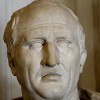“ Others, who are in fact nearer the truth, have considered it necessary that the universal good, which all men desire, should not consist in any of the particular things which can only be possessed by one man, and which, when shared, afflict their possessor more by the want of the part he has not, than they please him by the possession of what he has. ”
Blaise Pascal, Pensées (1670). copy citation
| Author | Blaise Pascal |
|---|---|
| Source | Pensées |
| Topic | truth sharing |
| Date | 1670 |
| Language | English |
| Reference | |
| Note | Translated by W. F. Trotter |
| Weblink | http://www.gutenberg.org/files/18269/18269-h/18269-h.htm |
Context
“And since man has lost the true good, everything can appear equally good to him, even his own destruction, though so opposed to God, to reason, and to the whole course of nature.
Some seek good in authority, others in scientific research, others in pleasure. Others, who are in fact nearer the truth, have considered it necessary that the universal good, which all men desire, should not consist in any of the particular things which can only be possessed by one man, and which, when shared, afflict their possessor more by the want of the part he has not, than they please him by the possession of what he has. They have learned that the true good should be such as all can possess at once, without diminution and without envy, and which no one can lose against his will. And their reason is that this desire being natural to man, since it is necessarily in all, and that it is impossible not to have it, they infer from it ...”
source


